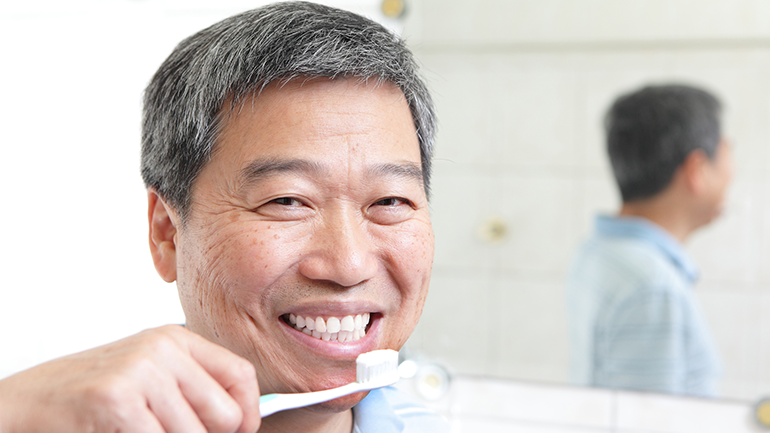
Get information on how to find affordable oral care and resources on how to keep your teeth and gums healthy.
Where can I find affordable dental care?
Dental care and treatment can be expensive. Several organizations across B.C. offer dental treatment at reduced rates. Find information on low cost dental programs for seniors here.
You may also want to contact local dental hygiene, denturist and dental assisting teaching institutions for low-cost services.
How do I keep my teeth healthy as I age?
To keep the teeth and gums healthy:
- Brush the teeth with fluoride toothpaste twice a day-in the morning and at night-and floss at least once a day.
- Watch for the signs of gum disease. If gums bleed after brushing, flossing or after eating hard foods, see your dental hygienist or dentist.
- See a dentist regularly. Experts recommend checkups every six months.
- Keep the dentist up to date on any new medication you are taking.
- Eat a balanced diet that includes whole grains, vegetables, and fruits, and that is low in saturated fat and sodium. Good nutrition is vital to maintaining healthy gums and avoiding tooth decay.
- Avoid using tobacco products. Tobacco and alcohol can affect oral health.
- Care for your dentures as you would with your teeth.
Learn more about maintaining good oral care and how to keep your teeth healthy.
How can I prevent myself from getting oral cancer?
Oral cancer is the growth of abnormal cells in any part of the mouth or lips. Most oral cancers start in the lining of the lips or mouth where you have thin, flat cells called squamous cells.
This type of cancer may also be called oral cavity cancer or oropharnygeal cancer.
Risk factors (things that increase your risk) for oral cancer include smoking (or using smokeless tobacco) and heavy alcohol use. Other risk factors are being male, using marijuana, or having human papillomavirus (HPV). For cancers of the lip, exposure over a long period of time to ultraviolet (UV) light from the sun or from tanning beds increases risk.
Symptoms for oral cancer include sores or lumps on the lips or in your mouth. Talk with your doctor if you have any of these signs:
- A sore on your lip or in your mouth that bleeds easily and does not heal
- A lump or thickening on your lips, gums, cheek, or in your mouth
- A white or red patch on your gums, your tongue, tonsils, or the lining of your mouth
- A sore throat or a feeling that something is caught in your throat
- Unexplained difficulty chewing, swallowing, speaking, or moving your jaw or tongue
- Numbness or pain in your tongue or other areas of your lips or mouth
- Swelling in your jaw that makes your teeth loose or your dentures fit poorly
- Changes in your voice
- Dry mouth (xerostomia)
How can caregivers support aging parents with their oral care?
Older adults may begin to rely on others to support their basic dental care need. If you have an aging parent or are a caregiver consider the following:
- Schedule regular dental appointments. Regular examinations can help to identify trouble signs early. This is particularly important for frail seniors who may not verbally communicate pain.
- Discuss ways to support a senior with their oral care. Speak to the dentist about tips to support the dental health care needs of an aging parent or person in your care.
- Remind seniors to brush and floss their teeth or to clean their dentures. In some cases, caregivers may need to do the brushing and other care. People who have trouble using their hands or who have dementia may need this extra help.
Learn more about supporting aging parents with their oral care.
Resources
- HealthLink BC: Dental care for older adults
Get more information on how to keep your teeth healthy. - Seniors First BC: Low cost dental programs
Find clinics that provide dental treatment at reduced rates. - BC Dental Association: Aging and oral health
Access information about aging and oral health. Also includes caregiver presentations and resources. - HealthLink BC: Oral cancer and Canadian Cancer Society: Oral cancer
Get information about the risk factors, symptoms, prevention and treatment for oral cancer. - Oral health in the Fraser Health region: Opportunities for action.
Report authored by the Chief Medical Health Officer, April 2025
